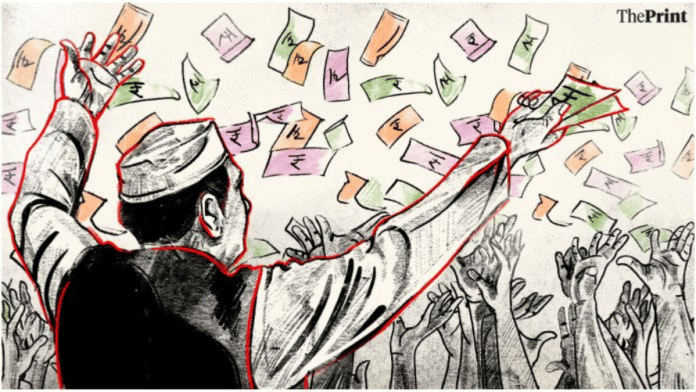When the political parties promise freebies such as free electricity, bus rides, TVs, and smartphones, is it genuine welfare or bait to the people? In India, the actual line between empowerment and electoral enticement is blurred. During every election, news on freebies dominates headlines in the media, raising support and criticism. We have deeper ethical and economic concerns – progress or dependence?
Freebie refers to something given to people without any target or goal, potentially discouraging labour participation, misallocating resources, and political manipulation. Welfare is something done with the target of correcting the structural inequities to increase the standard of living. But we notice that the political parties use pre-election giveaways (freebies) just to increase their vote banks without any gain to the people’s welfare. A survey conducted by the Lokniti-CSDS stated that over 55 per cent of voters said freebies “influenced” their vote, especially among low-income groups during the 2021 assembly elections in Tamil Nadu.
Where does it lead us? The political parties define it as a tool of social justice, but welfare economists say untargeted freebies are just a long-term strain on fiscal stability.”
We can trace the roots of freebies to the state of Tamil Nadu. It started in 1967, with the DMK promising rice at Rs 1/kg. But the real fierce freebie war started in 2006 between AIADMK and DMK, both competing by giving free TVs, wet grinders, blenders, fans, laptops etc. After Tamil Nadu, Delhi is in the limelight with freebies such as free water, electricity, given by the Aam Adam Party (AAP).
Actually, instead of raising the marginalised, it had raised the government debt. These vote baiting freebies by the parties had affected the fiscal health of the states. “It is estimated that the current state expenditure on freebies ranges between 0.1 per cent and 2.7 per cent of Gross State Domestic Product (GSDP), with less developed states incurring higher amounts, although they have lower affording capacity,” said Ajay Dua, former secretary in the Union Ministry of Commerce and Industry. According to NITI Aayog, data confirms that Punjab has 47 per cent debt to-GSDP in 2022-23, significantly above the median state average (~32 per cent) — a trend partly fuelled by election-linked giveaways.
When people trade votes for short-term benefits, their long-term welfare policies such as unemployment allowance get shelved. Consequently, people’s dependency on the government increases, but their actual economic welfare remains stagnant, which shatters the will to question the government. Ragavan, who runs a construction firm, said that people are not willing to work as they get all the necessary things to live a substandard life, without any thought about their children’s future.
The Supreme Court in E.R. Kumar v. Union of India said, “Unfortunately, because of these freebies, people are not willing to work. They are getting free rations, amounts without doing any work,” underlining how such policies discourage people from working.
What if the freebies are well-targeted? It lifts the deprived, creates human capital, increases the local demand, which actually leads to the maximum utilisation of the resources.
For instance, the midday meal scheme started in Tamil Nadu and the free Covid-19 vaccine exemplified how targeted universal social welfare can be. The transfer of funds through DBT (Direct Benefit Transfer) has reduced leakage to a large extent.
As development economist Jean Drèze notes, “Welfare must empower, not pacify.” Freebies, in their current form, tend to pacify rather than transform. These government benefits to the people curb the development of the private sector through crowding out of private investors.
Critics argue that the government subsidies and freebies are over-promising. If the government is giving free rice to those who cannot actually afford it then it is acceptable, but even some of the rich section of society is getting it and selling it. A rough calculation of the offers by the AIADMK and DMK during the 2016 elections points to an additional expenditure of more than Rs 76,000 crore per year. This freebie bait has a cascading effect on the political parties; one party influences another party to announce/distribute freebies to be alive in the satirical contest.
Whose money is the government spending? Isn’t the taxpayer’s money, which is supposed to be spent on ‘actual welfare’ schemes? The opportunity cost of the freebies is a capital multiplier, such as building infrastructure, education, health, PSU, etc. Many people have raised concerns about the government spending on freebies, which is anticipated to be more than the cumulative spending on health and education.
“If freebies undermine fiscal discipline, they also compromise future development,” said M Govinda Rao, former member of the 14th Finance Commission.
The Union government must stop all those untargeted freebies and allocate that money to less developed states as aid. There are inherent environmental problems attached to the freebies, such as the free water and electricity. As it is provided for free, the people tend to use more of it, depleting the natural resources on a large scale, especially the power sector, which faces the most burden.
What can be the way forward?
1) The government must provide a clear rationale and indication of the funds spent on the freebies (including schemes).
2) The Election Commission of India (ECI) shall strengthen its Model Code of Conduct.
3) The government should amend the Representation of the People’s Act 1951 so that the vote-bait freebie culture ends.
4) To create “Freebie Audit” under the Controller of the Auditor General (CAG).
Even if the political parties do vote-baiting politics, ultimately, the power of voting rests with the people. The people should act rationally before choosing whom to vote for, influenced by their present generation. Freebie has become an integral part of our culture; it is like adulterating milk – just improving the quantity with quality remaining sluggish.
M Avinash is an independent researcher from Ramjas College, University of Delhi, with interests in public policy, economy, and governance.






